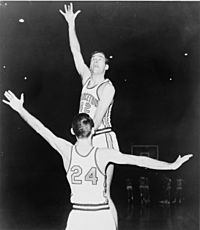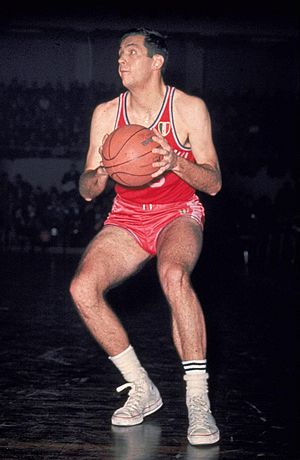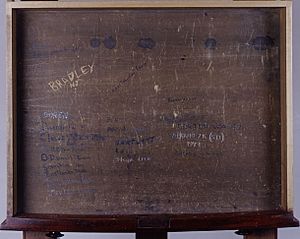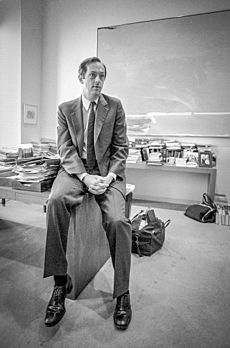Bill Bradley facts for kids
Quick facts for kids
Bill Bradley
|
||||||||||||||||||||||||||||||||||||||||||||||||||||||||||
|---|---|---|---|---|---|---|---|---|---|---|---|---|---|---|---|---|---|---|---|---|---|---|---|---|---|---|---|---|---|---|---|---|---|---|---|---|---|---|---|---|---|---|---|---|---|---|---|---|---|---|---|---|---|---|---|---|---|---|
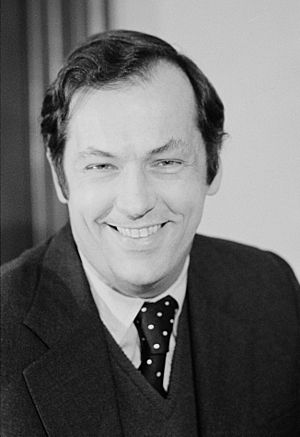
Bradley in 1980
|
||||||||||||||||||||||||||||||||||||||||||||||||||||||||||
| United States Senator from New Jersey |
||||||||||||||||||||||||||||||||||||||||||||||||||||||||||
| In office January 3, 1979 – January 3, 1997 |
||||||||||||||||||||||||||||||||||||||||||||||||||||||||||
| Preceded by | Clifford P. Case | |||||||||||||||||||||||||||||||||||||||||||||||||||||||||
| Succeeded by | Robert Torricelli | |||||||||||||||||||||||||||||||||||||||||||||||||||||||||
| Personal details | ||||||||||||||||||||||||||||||||||||||||||||||||||||||||||
| Born |
William Warren Bradley
July 28, 1943 Crystal City, Missouri, U.S. |
|||||||||||||||||||||||||||||||||||||||||||||||||||||||||
| Political party | Democratic | |||||||||||||||||||||||||||||||||||||||||||||||||||||||||
| Spouse |
Ernestine Misslbeck Schlant
(m. 1974; div. 2007) |
|||||||||||||||||||||||||||||||||||||||||||||||||||||||||
| Domestic partner | Betty Sue Flowers (2009 – present) | |||||||||||||||||||||||||||||||||||||||||||||||||||||||||
| Children | 1 | |||||||||||||||||||||||||||||||||||||||||||||||||||||||||
| Education | Princeton University (BA) Worcester College, Oxford (BA) |
|||||||||||||||||||||||||||||||||||||||||||||||||||||||||
| Military service | ||||||||||||||||||||||||||||||||||||||||||||||||||||||||||
| Allegiance | United States | |||||||||||||||||||||||||||||||||||||||||||||||||||||||||
| Branch/service | United States Air Force | |||||||||||||||||||||||||||||||||||||||||||||||||||||||||
| Unit | Reserve | |||||||||||||||||||||||||||||||||||||||||||||||||||||||||
|
||||||||||||||||||||||||||||||||||||||||||||||||||||||||||
William Warren Bradley (born July 28, 1943) is an American politician and former professional basketball player. He was a United States Senator for New Jersey from 1979 to 1997. He also ran for president in the 2000 election, seeking the Democratic Party's nomination. He lost to Al Gore, who was the Vice President at the time.
Bradley grew up in Crystal City, Missouri. He was very good at basketball from a young age. He also did well in school. He was offered many college scholarships but chose to attend Princeton University. He won a gold medal with the U.S. Olympic basketball team in 1964. He was named the Most Outstanding Player of the 1965 NCAA Tournament. After college, he studied at Oxford University in England on a Rhodes Scholarship.
Later, Bradley joined the New York Knicks in the National Basketball Association (NBA). He played for the Knicks for ten years, winning NBA championships in 1970 and 1973. After retiring from basketball in 1977, he ran for the United States Senate in New Jersey and won. He was re-elected twice before leaving the Senate in 1997.
Today, Bradley has written several books. He also hosts a radio show called American Voices. He works as a director for Starbucks and is a partner at an investment bank. He is also involved with groups that work to improve American politics.
Contents
Early Life and Growing Up
Bill Bradley was born on July 28, 1943, in Crystal City, Missouri. He was the only child of Warren and Susan Bradley. His father was a bank president, and his mother was a teacher and a former basketball player. Bill grew up hearing about politics at home. He was also an active Boy Scout and became an Eagle Scout.
Bradley started playing basketball when he was nine. He became a star player at Crystal City High School. He scored over 3,000 points during his high school career. He was named an All-American player twice. He received 75 scholarship offers from colleges.
Bill was tall for his age, reaching his adult height of 6 feet 5 inches (1.96 m) by age 15. He also had excellent peripheral vision, which helped him see the whole court. He practiced basketball for many hours every day. He would even put weights in his shoes and dribble around chairs to improve his skills. He worked hard to become a great player.
College Basketball Career
Bradley was considered the best high school basketball player in the country. He chose to attend Princeton University because he was interested in government work. He did not receive a sports scholarship because Ivy League schools do not offer them.
At Princeton, Bradley wore jersey number 42. He was an amazing player, even as a freshman. He averaged over 30 points per game. In his second year, he became a starter for the varsity team. He was named an All-American player.
In April 1964, Bradley was chosen for the U.S. Olympic team. He was the youngest player and the only college student on the team. The Olympic team won its sixth straight gold medal.
In his senior year (1964–1965), Bradley became very famous. He led Princeton to the NCAA Final Four. Even though they lost in the semifinals, Bradley scored a record 58 points in the consolation game. This earned him the Final Four MVP award. He scored 2,503 points in total at Princeton, averaging 30.2 points per game. He also won the 1965 James E. Sullivan Award as the top amateur athlete in the U.S.
Bradley holds many records at Princeton and in the Ivy League. He was known for his teamwork and often passed the ball to teammates. He was very disciplined and studied hard, spending many hours in the library. He graduated with honors and received a Rhodes Scholarship to study at Worcester College, Oxford in England.
Professional Basketball Career
In 1965, the New York Knicks drafted Bradley for the NBA. However, he first went to Oxford and played professional basketball in Italy for Olimpia Milano in the 1965–66 season. His team won a European Champions Cup. He also played for the Oxford University team, helping them win championships.
Bradley joined the New York Knicks in December 1967. He played for the Knicks for his entire ten-year professional career. He helped the team win two NBA championships, in 1970 and 1973. In 1973, he was also chosen for the NBA All-Star Game. Over his NBA career, he scored 9,217 points, averaging 12.4 points per game.
During his time in the NBA, Bradley used his fame to learn about social and political issues. He met with journalists, government officials, and activists. He also worked as a teacher in Harlem. In 1976, he wrote a book called Life on the Run, sharing his experiences in the NBA.
Bradley retired from basketball in 1977. He was later inducted into the Naismith Memorial Basketball Hall of Fame in 1983. The Knicks retired his number 24 jersey in 1984. He is one of only two players to have won a EuroLeague title, an NBA championship, and an Olympic gold medal.
Political Career
Politics was always a part of Bradley's life. He studied history at Princeton. Many people who knew him thought he would become a politician. His application for the Rhodes Scholarship even stated he wanted to serve mankind as a politician.
Becoming a U.S. Senator
After four years of helping Democratic candidates in New Jersey, Bradley decided to run for the United States Senate in 1977. He retired from the Knicks to focus on his campaign. He won the election in 1978.
As a Senator, Bradley was known for focusing on complex policy changes. He helped lead the 1986 reform of the federal tax code. This reform simplified tax rates and removed many deductions. He also worked on issues like child support, children's health, and reducing the government's debt.
Bradley was re-elected in 1984 and 1990. In 1995, he announced he would not run for re-election. He said that American politics felt "broken" to him. While in office, he would walk the beaches of New Jersey every Labor Day weekend. This allowed him to check on the beaches and talk with people in his state.
Running for President
Bradley ran for president in the 2000 Democratic primaries. He ran against Vice President Al Gore. Bradley presented himself as a more liberal choice than Gore. He supported ideas like universal health care, stricter gun control, and changes to campaign finance.
He also proposed plans for public education. He wanted to give money to states for schools and offer scholarships to new teachers. Bradley also made child poverty a key issue. He suggested ways to help families, like increasing the minimum wage and expanding food assistance programs.
Bradley received support from many important people. These included other senators, former government officials, and basketball stars like Michael Jordan and Phil Jackson. Jackson, who was a close friend and former teammate, often wore Bradley's campaign button.
Despite strong support and fundraising, Bradley's campaign struggled. He lost to Gore in the early primary elections. On March 9, 2000, he withdrew from the race and supported Gore. He said he would continue to speak out about his political ideas.
After Politics
In 2003, Oxford University gave Bradley an honorary degree. They described him as a great athlete, a strong Senator, and a powerful voice for those in need. In 2007, he received the Distinguished Eagle Scout Award for his community service.
Bradley has continued to be involved in public life. In 2008, he supported Barack Obama for president. He has also worked as a business consultant and investment banker. He is a managing director at Allen & Company LLC. He also serves on the boards of several companies and non-profit organizations.
Bradley is a board member for DonorsChoose.org. This online charity helps connect people with classrooms that need supplies. He also helps lead the Acumen Fund, which works to solve global poverty. In 2022, Bradley created a one-man show called Rolling Along. This show was filmed and released on the streaming service Max in 2024.
Personal Life
Bill Bradley married Ernestine Schlant in 1974. She was a professor. They had one daughter, Theresa Anne. They divorced in 2007. Since 2009, his partner has been Betty Sue Flowers.
Recognition
In January 2025, President Joe Biden announced that Bradley would receive the Presidential Citizens Medal.
Career Statistics
NBA
Regular season
| Year | Team | GP | GS | MPG | FG% | 3P% | FT% | RPG | APG | SPG | BPG | PPG |
|---|---|---|---|---|---|---|---|---|---|---|---|---|
| 1967–68 | New York | 45 | 11 | 19.4 | .416 | — | .731 | 2.5 | 3.0 | — | — | 8.0 |
| 1968–69 | New York | 82 | 39 | 29.4 | .429 | — | .814 | 4.3 | 3.7 | — | — | 12.4 |
| 1969–70 |
New York | 67 | 64 | 31.3 | .460 | — | .824 | 3.6 | 4.0 | — | — | 14.5 |
| 1970–71 | New York | 78 | 66 | 29.5 | .453 | — | .823 | 3.3 | 3.6 | — | — | 12.4 |
| 1971–72 | New York | 78 | 78 | 35.6 | .465 | — | .849 | 3.2 | 4.0 | — | — | 15.1 |
| 1972–73 |
New York | 82* | 82* | 36.6 | .459 | — | .871 | 3.7 | 4.5 | — | — | 16.1 |
| 1973–74 | New York | 82* | 82* | 34.3 | .451 | — | .874 | 3.1 | 3.0 | .5 | .3 | 14.0 |
| 1974–75 | New York | 79 | 79 | 35.3 | .436 | — | .873 | 3.2 | 3.1 | .9 | .2 | 13.3 |
| 1975–76 | New York | 82 | 82 | 33.0 | .433 | — | .878 | 2.9 | 3.0 | .8 | .2 | 11.1 |
| 1976–77 | New York | 67 | 5 | 15.3 | .464 | — | .810 | 1.5 | 1.9 | .4 | .1 | 4.3 |
| Career | 742 | 588 | 30.7 | .448 | — | .840 | 3.2 | 3.4 | .7 | .2 | 12.4 | |
| All-Star | 1 | 0 | 12.0 | .400 | — | — | 1.0 | .0 | — | — | 4.0 | |
Playoffs
| Year | Team | GP | GS | MPG | FG% | 3P% | FT% | RPG | APG | SPG | BPG | PPG |
|---|---|---|---|---|---|---|---|---|---|---|---|---|
| 1968 | New York | 6 | 0 | 10.7 | .429 | — | .692 | 1.0 | .3 | — | — | 5.5 |
| 1969 | New York | 10 | 10 | 41.9 | .461 | — | .769 | 7.3 | 4.0 | — | — | 16.0 |
| 1970 |
New York | 19 | 19 | 32.4 | .429 | — | .814 | 3.8 | 3.2 | — | — | 12.4 |
| 1971 | New York | 12 | 12 | 30.7 | .424 | — | .737 | 3.4 | 3.6 | — | — | 10.5 |
| 1972 | New York | 16 | 16 | 37.1 | .467 | — | .839 | 2.9 | 3.4 | — | — | 16.2 |
| 1973 |
New York | 17 | 17 | 34.5 | .448 | — | .800 | 3.4 | 2.6 | — | — | 14.0 |
| 1974 | New York | 12 | 12 | 35.4 | .396 | — | .862 | 2.3 | 1.1 | .6 | .3 | 12.6 |
| 1975 | New York | 3 | 3 | 29.3 | .375 | — | 1.000 | 3.0 | 2.0 | .7 | .0 | 6.7 |
| Career | 95 | 89 | 33.3 | .438 | — | .805 | 3.5 | 2.8 | .6 | .2 | 12.9 | |
Published Works
- Bradley, Bill Life on the Run (Bantam Books, 1977) ISBN: 0-553110551
- Bradley, Bill Time Present, Time Past: A Memoir (Alfred A. Knopf, 1996) ISBN: 978-0679444886
- Bradley, Bill Values of the Game (Artisan, 1998) ISBN: 1-57965116X
- Bradley, Bill The Journey from Here (Artisan, 2000) ISBN: 1-579651658
- Bradley, Bill The New American Story (Random House, 2007) ISBN: 978-1400065073
- Bradley, Bill We Can All Do Better (Vanguard Press, May 8, 2012) ISBN: 978-1593157296
See also
 In Spanish: Bill Bradley para niños
In Spanish: Bill Bradley para niños
- List of NCAA Division I men's basketball career free throw scoring leaders
- List of NCAA Division I men's basketball players with 2000 points and 1000 rebounds
- List of Princeton University Olympians
- List of NBA players who have spent their entire career with one franchise
 | George Robert Carruthers |
 | Patricia Bath |
 | Jan Ernst Matzeliger |
 | Alexander Miles |


